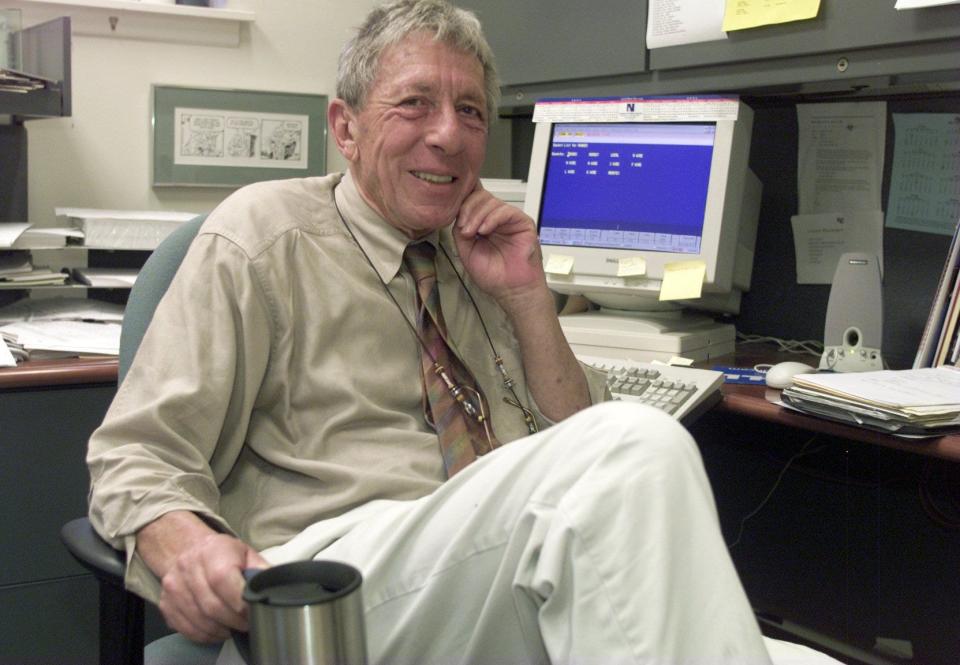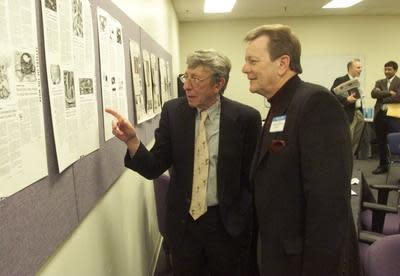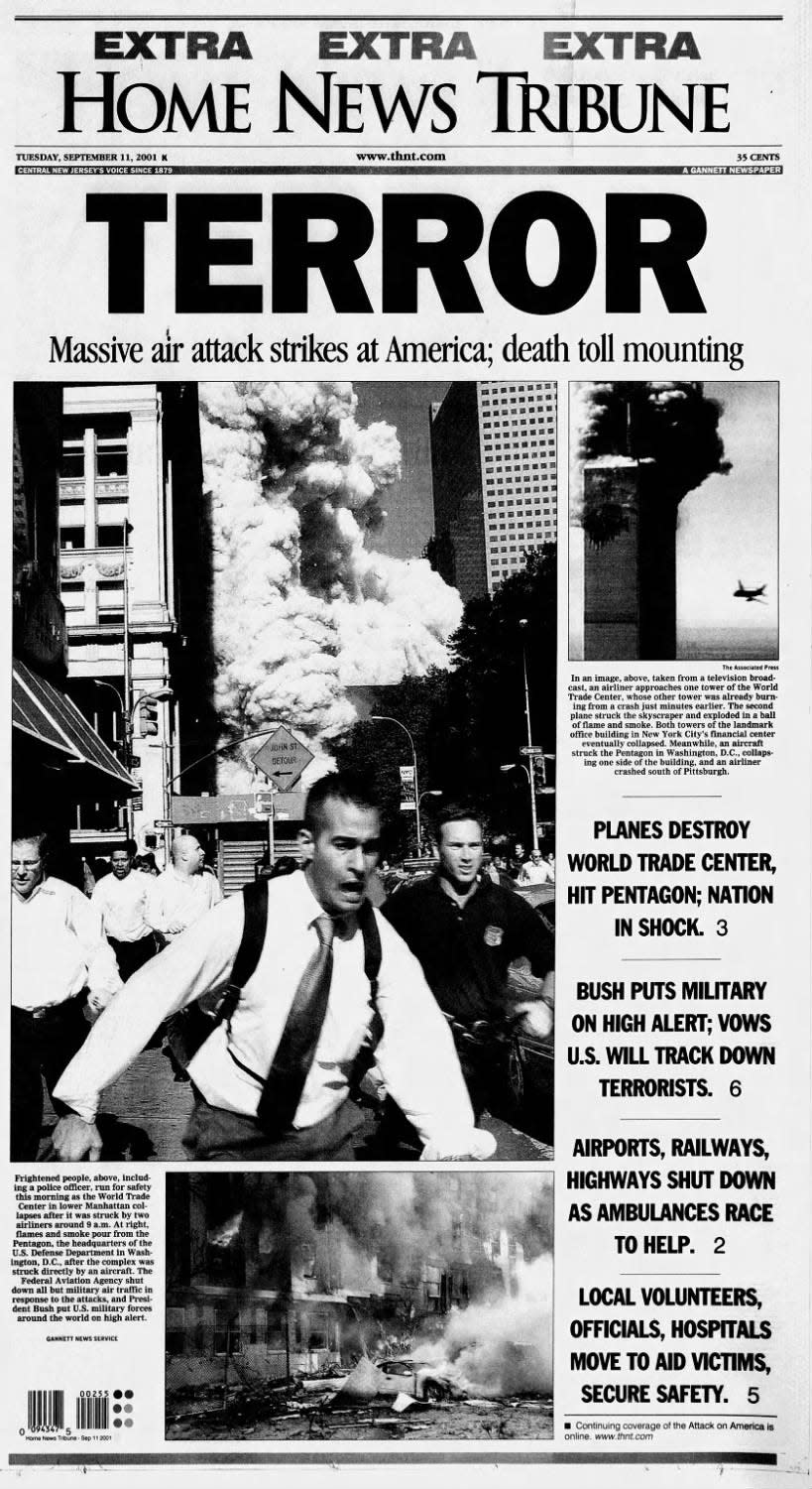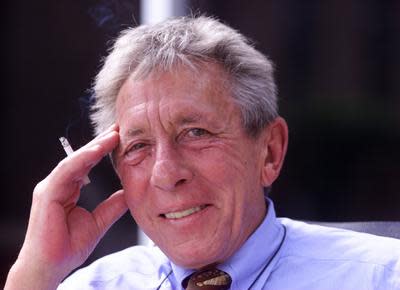Richard Hughes, longtime former editor of The Home News Tribune, dies at 86
Richard A. Hughes, the longtime former editor of The Home News and The Home News Tribune who died last weekend, is being remembered for his strong sense of ethics and his quests for the truth and to make a difference in the world.
Hughes, 86, known as "Dick," died Aug. 20 at his home in Sayre, Pennsylvania, with his wife, Kathryn, by side. He had struggled for months with congestive heart failure, according to his obituary.
Hughes joined The Home News of New Brunswick in 1980 and worked as a copy editor and deputy managing editor before becoming editor in 1986. In 1995 the newspaper merged with The News Tribune of Woodbridge and became The Home News Tribune.
Hughes retired as editor-in-chief of The Home News Tribune in September 2002 at age 65, and later worked as a reporter for newspapers in Moorefield, West Virginia, and Greenville, South Carolina, into his 70s.
Hughes was editor when The Home News was sold to the parent company of the Asbury Park Press in 1993, and in 1997 when both papers were sold to the Gannett newspaper chain.

Charles Paolino, former editor of The News Tribune who later followed Hughes indirectly as editor of The Home News Tribune, said the two first knew each other as competing editors of different newspapers serving the Central Jersey area, who would meet at New Jersey Press Association and Associated Press editors’ events.
At newspapers just miles apart, Hughes, first in New Brunswick, then in East Brunswick, and Paolino, in Woodbridge, helmed what in those days was a fierce newspaper competition, which Paolino said also included The Courier News and The Elizabeth Daily Journal. And while there was no love lost, everyone respected each other, he said.
Following the merger, Paolino said Hughes and the newspaper went out of their way to be welcoming to The News Tribune staff who were hired, serving a big breakfast the first day.
"We were not made to feel like some poor cousins who were coming in because we couldn't pay our own rent," Paolino said. "For a few years there that was one of the best places you could possibly work. We had the bureau in Woodbridge. It was what you would dream of working at a newspaper and Dick was the head of that. We were covering everything that moved. It was the last gasp of the great local newspaper. It was all Dick's vision."
Paolino said Hughes never made him feel like he had been demoted when the newspapers merged, even though that was the reality.
"He treated me with great respect," said Paolino who became head of the Woodbridge bureau to maintain a presence in that town, even though the bureau had not yet opened.
Hughes set high standards
"He set the highest possible standards for journalism. There was no fooling around, no outside influences were going to touch him. He would even call out his own employer if he thought the ethics of the newsroom were threatened or being compromised. It was interesting to sit at meetings with him with political figures in governments because he would instantly call them out on anything they said that didn't make sense or seemed to contradict the facts," Paolino said.
Paolino remembers a time when a member of the state legislature came in for an editorial board meeting before an election and after making his presentation, Hughes looked at the legislator and said, "How do you live with yourself?"
"He was just blunt," Paolino said.
Paolino remembers former Perth Amboy Mayor Joseph Vas came in with a group for a meeting to discuss a project he was working on, and the Perth Amboy reporter also participated. During the meeting Vas opened an envelope and began going through newspapers clips by the Perth Amboy reporter and saying what was wrong with them. Then he said he didn't come to pick on the reporter.
"Yes, you did. You do it every time you come here and I'm sick of it," Hughes said in response, according to Paolino.
"You had to be honest with Dick; if you weren't honest with Dick he would call you on it. There was no question about it," Paolino said. "His own standards were very, very high."

Tammy Paolino, who considers Hughes a mentor, said her first interaction with him was after she graduated college and was looking for a full-time job.
"Dick offered me a part-time job writing about real estate news for the then-Home News, but when I told him I’d had full-time offers to do community beat reporting at my local weekly and a Pennsylvania daily, he encouraged me to take one of those but stay in touch. I valued his encouragement, and his counsel that to become a good journalist I had to learn the ropes first-hand and be out in the community," she said. "He hired me in 1997 to work in features at the Home News Tribune, a job I loved and held for seven years. He remains one of the best newsroom leaders I’ve ever had and I will always be grateful for his mentorship, rock-solid ethics and deep commitment to community journalism."
Barbara Frankel, former Home News and Home News Tribune managing editor, Sunday editor and editorial page editor who worked with Hughes for about 15 years, said he was "the most ethical person I can ever remember. "
"He was the most ethical, honorable journalist I ever knew. He really, really cared about the truth. He had a real passion for the truth and letting people know the truth and whole story and all sides of the story," Frankel said.
Frankel also said when anything went wrong, Hughes was always the first to say it has to be corrected and never try to hide anything.
"If there was an advertiser bucking for special treatment or if there were advertisers who wanted us not to write about certain things, he would always stand up to them," Frankel said.
Hughes' view of the world
Charles Paolino said another reporter mentioned on Facebook that Hughes hired her when she was wearing Islamic clothing.
"It was before inclusion was a thing; Dick was already inclusive before other people discovered that. He was blind to the differences between people. He loved diversity and he was extremely respectful. He was very respectful of a person's identity," Paolino said.
Born and raised in Bismarck, North Dakota, Hughes joined the Peace Corps in 1962 and served in Nigeria as an English teacher after graduating from the University of North Dakota, where he studied English and History and then taught high school English in Tomah, Wisconsin.
"So he had an international point of view before he even became a newspaper editor," said Paolino, adding Hughes was interested in international affairs and solving people's social problems.
Frankel said his work in the Peace Corps showed his passion for helping others and making a difference.
"He really had that. He really, really wanted to help people with what was happening in the world, in the right context and getting the truth out to people and if that wasn't pleasant, he didn't care," Frankel said. "There aren't too many people like him around anymore."
After the Peace Corps Hughes worked for the Chicago bureau of the United Press International wire service, in Michigan, Paris, Detroit and New York. In 1979, he co-authored the book "The Tranquilizing of America" about the nation’s reliance on prescription drugs. When he decided to work for a newspaper, he applied for a job in Maine before the then-editor of The Home News, whom he knew from Michigan, invited him to come to the New Brunswick newspaper in 1980.
Frankel said she last saw Hughes around 2019 at a newsroom reunion. Paolino also last saw Hughes several years ago.
"He was emblematic of that old-style really caring kind of 'I'll save the world and tell the truth journalism,’" said Frankel, who remembers Hughes wanted no stone left unturned in the 1991 disappearance and murder case of Timothy Wiltsey, a 5-year-old South Amboy boy.
The 9/11 Home News Tribune Extra

Paolino described Hughes as a "great leader," with no greater example than the newspaper's coverage on Sept. 11, 2001.
That morning Paolino did not have his radio on during his drive to work and when he walked into the newsroom, he saw Hughes standing with Fran Waldman, newsroom administrator, watching the TV after a plane hit the World Trade Center. After the second plane hit and it became clear it was intentional, Hughes immediately envisioned what the paper would do.
"We were going to publish two editions of the paper in the same day, something we had never done before," Paolino said. "He immediately decided who was going to do what, he took input from everyone on what we should do and where we should go. The whole thing was done in an atmosphere of calm, not panic and because he approached it that way, we did that. We put out two editions on the same day without ever breaking a stride."
"He saw the whole picture at once, rather than coming apart at the seams. He just managed that so well. Because he didn't panic nobody else panicked," Paolino said.
"Dick was absolutely the best. He could do anything, he really could," said Mark Frisby, a former Gannett newspaper publisher who worked with Hughes for about five years.
Frisby said on Sept. 11, 2001, Hughes came to his office in Freehold.
"He was the first one that said let's do an extra," Frisby recalled, adding others weren't supportive of the idea, but Hughes insisted. "So we did an extra and it went like crazy."
Frisby said there wasn't much that Hughes couldn't or wouldn't do.
"I really liked Dick a lot," Frisby said. "He was a great editor. He was on top of a story quicker than anyone."
Hughes' connection to New Brunswick
Christopher Paladino, president of the New Brunswick Development Corporation, who grew up delivering The Home News, said Hughes was "a classic old-school journalist."
"It was cigarette smoking, a lot of yelling, loud typewriting, and he was genuinely interested in the content of the newspaper. He was thorough, he was fair. He did things with good humor. He was tenacious. If it was only the Dick Hughes era, we would have engaging conversation and discussion about issues at editorial board meetings," said Paladino, adding the last time he was at an editorial board meeting was with Hughes.

Paladino said Hughes worked with young reporters because he thought it was important to bring people along in the business.
"If you got back from lunch and he had called, you immediately called him back. He returned your phone calls even though he was the editor of the paper. Yet if you did something he thought was stupid, he was going to nail you, but he called you and told you he was going to do it, so you didn't wake up on Sunday morning and be surprised," Paladino said. "I had the upmost respect for him and from the day he left, in some ways, journalism in New Jersey lost something."
Paladino said he never talked Hughes out of anything or talked him into anything. He said the reporters were well prepared, which he thinks is due to the way Hughes managed and encouraged reporters to understand the issues, not just the news.
Although The Home News had moved out of New Brunswick into East Brunswick, Paladino said Hughes was still interested in the Hub City and had a historical perspective of the work Paladino was picking up.
"He was very interested in what was happening. I think he held New Brunswick's future as something that he was rooting for. I think he was rooting for New Brunswick to continue with its resurgence and revitalization," he said.
Besides his wife Kathryn, Hughes is survived by his daughter Amy Hughes, her husband Jonathan Schuppe and his grandchildren Vivienne and Nicholas Schuppe, of Maplewood; his daughter Cressida Payavis, of New York City; and his brother Bobby Hughes and his wife Barbara, of Dickinson, North Dakota.
Email: srussell@gannettnj.com
Suzanne Russell is a breaking news reporter for MyCentralJersey.com covering crime, courts and other mayhem. To get unlimited access, please subscribe or activate your digital account today.
This article originally appeared on MyCentralJersey.com: Richard Hughes, longtime former editor of The Home News Tribune, dies

